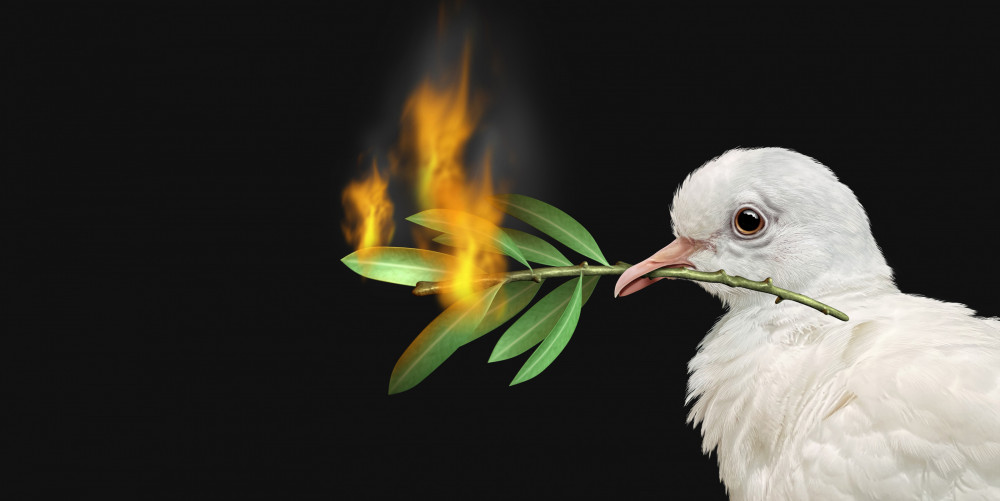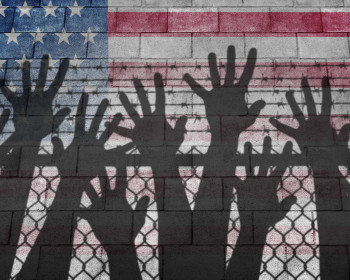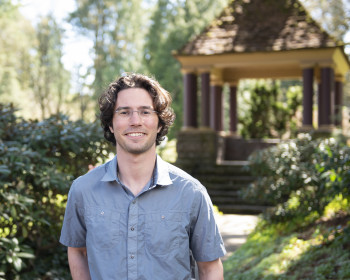Teach-In on Palestine and Israel Generates Strong Turnout
In an effort to grapple with the unfolding tragedy in Gaza and Israel, Lewis & Clark hosted a multidisciplinary forum, featuring a faculty panel followed by a Q&A.

Credit: Getty Images
An overflowing crowd greeted presenters at Lewis & Clark’s Teach-In on Palestine and Israel, held November 14 on the undergraduate campus. The event was designed as an educational forum and a space for the community to come together to learn amidst the unfolding tragedy in Israel and Gaza and the acute suffering in the region. The session used a classroom format and featured a faculty panel discussing the impact of the conflict in Gaza and Israel through the lens of their respective academic disciplines.
According to organizers, the event was designed to explore the “multiple historical trajectories, intersecting perspectives, and possible futures that frame the tragedy” as a step toward furthering greater understanding. The teach-in “considered how scholarship in history, anthropology, religious studies, psychology, and other fields can help to reflect on the politics and ethics of justice, reconciliation, and peace.”
Oren Kosansky, associate professor of anthropology, was among the faculty who organized the event along with MaryAnn Bylander, associate professor of sociology; Paul Powers, professor of religious studies; and Diana Leonard, associate professor and chair of psychology.
Close to 150 students, staff, and faculty showed up, quickly exceeding the 100-seat capacity of the venue. Dozens of community members, mostly students, spilled out into the hallway and adjoining room. They hoped to be able to hear the panelists’ remarks and discussion. Partway through the talk, a microphone was brought in to improve the ability for participants to hear both inside and outside the room.
“The event exhibited the best of who we are as a community: thoughtful, respectful, and curious,” said Bruce Suttmeier, dean of the College of Arts and Sciences. “The faculty presentations and students’ questions highlighted what our community of scholars does best: exchange ideas, listen, and learn from each other.”
Suttmeier added: “While I was glad to see so much interest in the teach-in, I regret that we did not host it in a larger space to be able to accommodate everyone who wanted to attend. It’s clear that we need more engagement on this topic. We hope to offer another teach-in soon.”
Examining Conflict Through Varying Disciplines
During the talk, Paul Powers, one of the faculty panelists, offered his perspective as a scholar of religion.
“Many people claim that religion is a driver of violence, as in ‘religion causes most wars,’ said Powers, whose research interests include pre-modern Islam and Islamic law. “The Israel-Hamas war may look like a case in point. But it is rare to find cases of people hurting other people exclusively because of religious differences.”
Powers said that violent conflict is often about access to resources and that people “group up around religion.”
“Pursuit of land, water, food, employment, power, status, etc.,” he said, is behind a lot of violence. “Violence can be expressive, communicative, and strategic.”
“The event exhibited the best of who we are as a community: thoughtful, respectful, and curious.”
—Bruce Suttmeier, Dean of the College of Arts and Sciences
Panelist Diana Leonard, an experimental social psychologist, focused her talk on the Black Diaspora perspective of conflict. Among Leonard’s research areas is the study of emotions felt as a consequence of social identities and the impact of these identity-driven emotions on group processes.
Toward the end of his remarks, Powers cautioned the group to resist thinking about the conflict in religious terms.
“The evidence that this reductionist framing is woefully inadequate is all around you,” he said. “Such language only serves the cause of escalating, prolonging, expanding, and inflaming the fighting.”
Leonard concluded her remarks with a call for encouragement and hope.
“I choose to be hopeful about an international scope of conversation that sheds greater light on complex forces of destruction. I choose to be hopeful about turning that lens toward concrete goals of sustainability and mutual aid, rebuilding what is broken,” she said. “I choose to be hopeful because we are here today learning together; perhaps because you know, as I do, that, as Martin Luther King Jr. wrote, ‘We are caught in an inescapable network of mutuality, tied in a single garment of destiny.’”
More Newsroom Stories
Public Relations is located in McAfee on the Undergraduate Campus.
MSC: 19
email public@lclark.edu
voice 503-768-7970
Public Relations
Lewis & Clark
615 S. Palatine Hill Road MSC 19
Portland OR 97219

